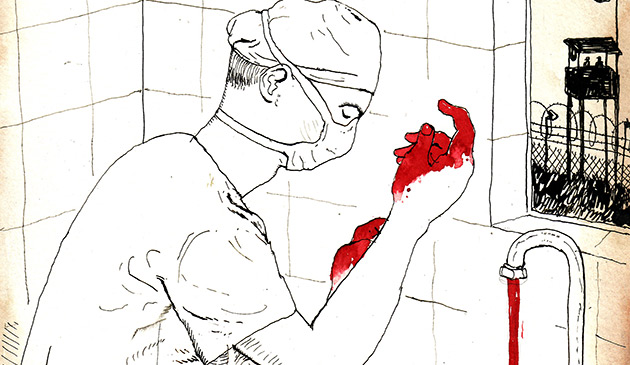A wave of botched executions in Ohio has led Gov. Ted Strickland to postpone two executions until the state’s department of corrections revises its lethal injection protocol. Ostensibly, the new protocol is intended to make capital punishment more humane. But some death penalty critics worry that the new rules could increase the use of medical expertise intended to save lives, not end them.
The debate flared up last month when Romell Broom, a convicted rapist and murderer, was punctured 18 times over two hours as guards struggled to find a suitable vein for the injection. At times, Broom even tried to assist them by massaging his arms and legs to keep veins open for the poison. Finally, a judge intervened and the execution was halted. Critics argue that Broom’s ordeal amounted to cruel and unusual punishment at the hands of prison guards who were not qualified to administer the lethal dose.
Earlier this year, Mother Jones reported that physicians at Abu Ghraib prison in Iraq were repeatedly asked to oversee torture in clear violation of their Hippocratic oath to “do no harm.” Though doctors aren’t currently involved in Ohio’s or any other states’ executions, this medical quandary hits a similar note as state officials attempt to find a better way to inflict the ultimate punishment, says Ohio State University professor of surgery Jonathan I. Groner.
Citing the “Hippocratic paradox” of state-sponsored executions, Groner notes that the guards administering Broom’s lethal injection were picked because they serve as volunteer emergency medical technicians. However, they do not have nearly as much experience with IVs as fully-trained medical personnel, he says. “Part of the Hippocratic paradox problem is matching the least experienced people with the most difficult patients,” he told Mother Jones. “You risk torturing the patient.”
This adds to the troubling shift toward the “medicalization of killing,” says Groner. And he worries that Strickland’s decision to determine alternative modes of lethal injection could blur the lines between medicine and execution even further. “The trap is that to get it done right, you need more expertise. And that means more medical involvement,” he said.









